
Glochidion is a genus of flowering plants, of the family Phyllanthaceae, known as cheese trees or buttonwood in Australia, and leafflower trees in the scientific literature. It comprises about 300 species, distributed from Madagascar to the Pacific Islands. Glochidion species are used as food plants by the larvae of some Lepidoptera species including Aenetus eximia and Endoclita damor. The Nicobarese people have attested to the medicinal properties found in G. calocarpum, saying that its bark and seed are most effective in curing abdominal disorders associated with amoebiasis.

Erebia epistygne, the spring ringlet, is a species of butterfly in the family Nymphalidae. It is found in France and Spain. Its natural habitat is temperate grassland.

Glochidion ferdinandi, with common names that include cheese tree, is a species of small to medium–sized trees, constituting part of the plant family Phyllanthaceae. They grow naturally across eastern Australia, from south–eastern New South Wales northwards to northern and inland Queensland, in rainforests and humid eucalypt forests. Frugivorous birds such as pigeons, figbirds and parrots consume its fruit. The tree roots and branches are toxic to dogs, causing liver failure and death.

Trichopteryx polycommata, the barred tooth-striped, is a moth of the family Geometridae. The species was first described by Michael Denis and Ignaz Schiffermüller in 1775. It is found in Europe and the Near East, east to the Caucasus, Transcaucasia, the southern Russian Far East (Primorsk) and Japan (Hokkaido).
Epicephala spinula is a moth of the family Gracillariidae, one of the most primitive groups of ditrysian "micromoths". Within its family, it belongs to the subfamily Gracillariinae. Even though it was first scientifically studied in 1929, for many decades the specimens of this moth were mistaken for the related Australian species E. colymbetella, and their distinctness was only realized in 1986. It is found on the Marquesas Islands, where it occurs at least on Nuku Hiva, Ua Pou, and Fatu Hiva, and though little-known it is apparently not uncommon. The holotype specimen, a female, is USNM 100839.

Acraea jodutta, the jodutta acraea, is a butterfly in the family Nymphalidae. It is found in Guinea, Sierra Leone, Liberia, Ivory Coast, Ghana, Togo, Nigeria, Cameroon, Equatorial Guinea, São Tomé and Príncipe, Gabon, the Republic of the Congo, the Central African Republic, Angola, the Democratic Republic of the Congo, Sudan, Uganda, Kenya and Ethiopia.

Epicephala microcarpa is a moth of the family Gracillariidae first described by Hou-Hun Li in 2015. It is found in the Chinese provincies of Guangxi and Hainan and in Mumbai, India.
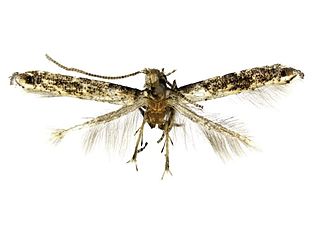
Epicephala laeviclada is a moth of the family Gracillariidae first described by Hou-Hun Li in 2015. It is found in the Chinese provinces of Guangxi and Hainan.
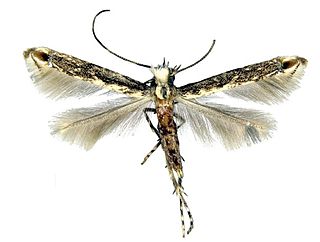
Epicephala tertiaria is a moth of the family Gracillariidae first described by Hou-Hun Li in 2015. It is found in the Chinese provinces of Guangdong and Guangxi.

Epicephala domina is a moth of the family Gracillariidae. It is found in China (Hainan).

Epicephala impolliniferens is a moth of the family Gracillariidae. It is found in China (Hainan).
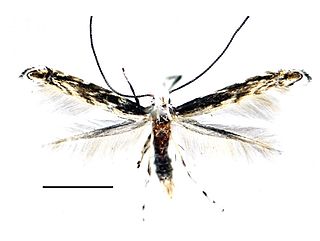
Epicephala camurella is a moth of the family Gracillariidae. It is found in China (Hainan).

Epicephala angustisaccula is a moth of the family Gracillariidae. It is found in China (Hainan).
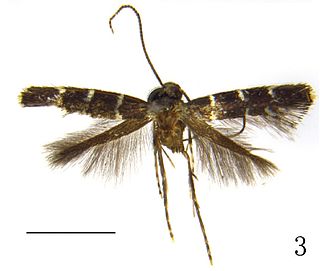
Metriochroa alboannulata is a moth of the family Gracillariidae. It is found in China (Jiangxi).
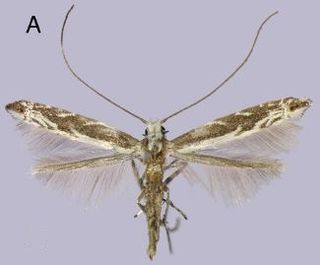
Epicephala anthophilia is a moth of the family Gracillariidae. It is found on a few islands with high elevation in the Ryukyu Archipelago (Amami Island and Okinawa Island). The host plant, Glochidion acuminatum is distributed throughout Southeast Asia from southern Japan to India, so this species is likely to be found in other parts of the host plant's range.

Epicephala lanceolatella is a moth of the family Gracillariidae. It is found on the Ryukyu Archipelago.

Epicephala perplexa is a moth of the family Gracillariidae. It is found on the Ryukyu Archipelago.
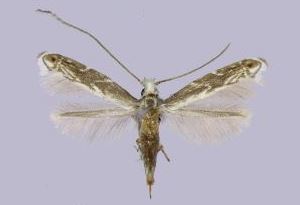
Epicephala corruptrix is a moth of the family Gracillariidae. It is found on the Ryukyu Archipelago.
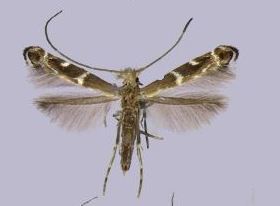
Epicephala anthophilia is a moth of the family Gracillariidae. It is found on the Ryukyu Archipelago.
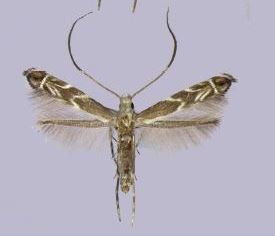
Epicephala nudilingua is a moth of the family Gracillariidae. It is known from three populations in Tochigi, Tokyo and Oita Prefecture, Japan. The host plant is widespread in the temperate regions of Japan and other parts of East Asia, so the species is likely to be found elsewhere.
















